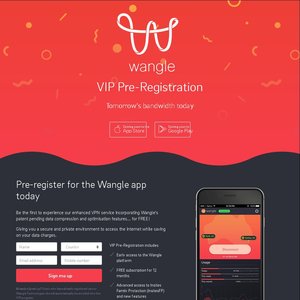Registering for the Wangle App prior to release (October the 14th) will grant 12 months free subscription. The app promises:
- Wangle lets you monitor your connection speed and allows you to see how our technology has performed on all your favourite apps.
- Our patent pending technology helps reduce your data consumption, saving you time and money.
- We optimise your data before sending it across our private network, so you have an added layer of encryption and privacy.
- You'll notice the decrease in time to download or stream your favourite content, greatly enhancing your user experience.


is this a free vpn?